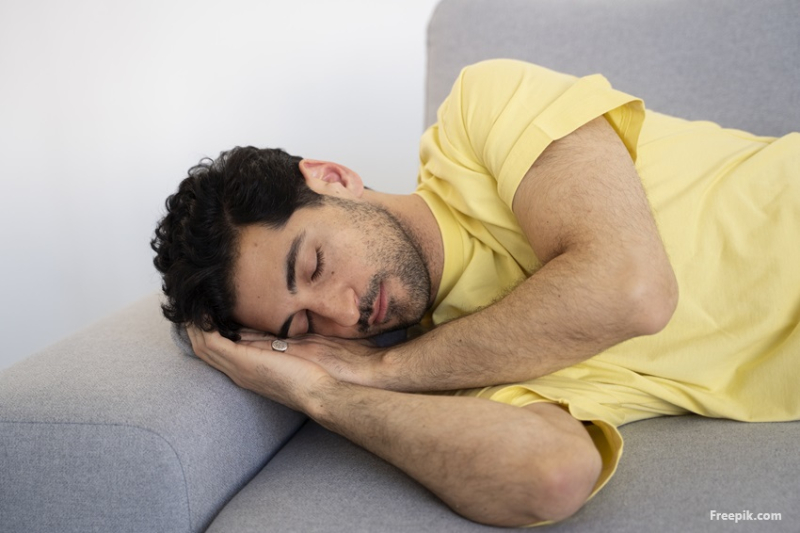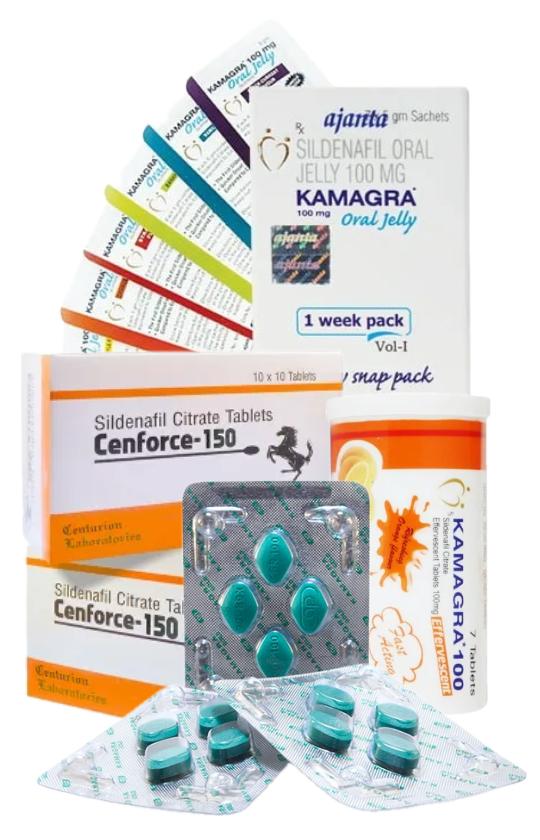Erectile dysfunction (ED) is a condition that affects a man's ability to achieve or maintain an erection firm enough for sexual activity. It is one of the most common sexual health issues, particularly among men over the age of 40. However, ED can occur at any age and is influenced by various physical and psychological factors .
According to studies, millions of men globally experience some degree of ED, highlighting its widespread nature. This makes understanding the underlying causes crucial for improving men’s sexual health.
This might also interest you: Erectile Dysfunction at 20 or Erection Problems at 60.
In this article, we will explore how sleep affects erectile dysfunction, including the science behind it, the impact of poor sleep, and how better sleep can improve sexual function.
- Introduction
- The Science Behind Sleep and Erectile Dysfunction
- How Poor Sleep Contributes to Erectile Dysfunction
- Can Better Sleep Improve Your Erection?
- Modern Pharmaceutical Treatments for Erectile Dysfunction
- Holistic approach
- Conclusion
Introduction
Sleep plays an essential role in maintaining overall health, including mental, physical, and sexual well-being. Poor sleep has been linked to a wide range of health problems, such as heart disease, obesity, and hormonal imbalances, which can also contribute to ED.
A lack of sleep disrupts the body’s natural balance, leading to lower testosterone levels and reduced sexual performance. Restorative sleep supports healthy blood flow and hormone regulation, both of which are vital for sexual function. Thus, addressing sleep issues can have a significant impact on preventing or improving erectile dysfunction.
This might also interest you: Obesity and Erection Problems
While medical treatments like medications and therapy are commonly prescribed for ED, addressing lifestyle factors, such as sleep, is equally important. Many men focus solely on medical interventions without realizing that poor lifestyle choices may be exacerbating their symptoms. Improving sleep quality, reducing stress, and maintaining a healthy diet can work in tandem with medical treatments to enhance outcomes.
A holistic approach that incorporates lifestyle changes is often more effective for long-term improvement. Sleep, in particular, should not be overlooked as a key factor in ED management.
You might be interested: Medication for Erectile Dysfunction
The Science Behind Sleep and Erectile Dysfunction
Achieving and maintaining an erection is a complex process that involves both the nervous and endocrine systems working together. The brain sends signals through the nervous system to the blood vessels in the penis, causing them to dilate and allow increased blood flow.
At the same time, the endocrine system releases hormones, such as testosterone, which are essential for sexual arousal and function. Any disruption in these processes—whether from stress, hormonal imbalances, or poor circulation—can lead to problems with erectile dysfunction.
Sleep, especially REM (rapid eye movement) sleep, plays a crucial role in maintaining sexual health. REM sleep is the stage when the brain is most active, and it’s also when testosterone production peaks. Testosterone, the primary male sex hormone, is vital for sexual desire and erectile function. A consistent lack of REM sleep can lead to reduced testosterone levels, which may contribute to erectile dysfunction.
Moreover, poor sleep can negatively impact the nervous system, making it harder for the body to respond to sexual stimuli effectively.
When sleep is disrupted, the body’s natural rhythms—including hormone production—are thrown off balance. Over time, this can lead to chronic issues with sexual performance, such as ED. Prioritizing quality sleep allows the body to regenerate and restore its essential functions, including the production of testosterone and the regulation of the nervous system.
Without adequate rest, even the best medical treatments for ED may not be as effective. This is why improving sleep should be a foundational step in any comprehensive approach to addressing erectile dysfunction.
How Poor Sleep Contributes to Erectile Dysfunction
Hormonal Imbalances from Inadequate Sleep
Poor sleep disrupts the body’s delicate hormonal balance, affecting not only sexual function but also overall health. During sleep, the body undergoes crucial processes that regulate hormones essential for energy levels, mood, and physical performance.
Inadequate sleep interferes with these processes, leading to fatigue, mood swings, and decreased vitality, which can all contribute to erectile dysfunction. Additionally, sleep deprivation can lower the production of growth hormones needed for tissue repair and recovery, further weakening sexual function.
Increased Stress and Anxiety
Lack of sleep also contributes to increased stress and anxiety, which are major factors in erectile dysfunction. Sleep deprivation triggers the release of cortisol, the body’s primary stress hormone, which negatively impacts mood and mental well-being. When stress levels are high, the body’s fight-or-flight response is activated, reducing blood flow to non-essential functions, including sexual organs. This can result in both physical and psychological barriers to sexual performance.
Disruption of the Body’s Circadian Rhythm
The body’s circadian rhythm, or internal clock, regulates key biological functions, including sleep cycles, metabolism, and even sexual health. When this rhythm is thrown off due to poor sleep habits or disorders, it can lead to imbalances in energy levels and physical performance, making it harder for the body to function optimally.
A disrupted circadian rhythm affects the timing of crucial processes like blood flow regulation and hormone release, both of which are necessary for erectile function. Without a consistent sleep-wake pattern, the body struggles to synchronize these processes, increasing the likelihood of erectile dysfunction.
Can Better Sleep Improve Your Erection?
Improving sleep quality can have a profound effect on reducing or even reversing the severity of erectile dysfunction. When the body receives enough restorative sleep, it can better regulate the processes responsible for sexual health, such as hormone production, blood flow, and emotional stability.
With better sleep, men often experience increased energy, improved mood, and enhanced physical performance, all of which contribute to healthier erections. Consistent, high-quality sleep also supports the nervous and endocrine systems, allowing the body to respond more effectively to sexual stimuli.
When sleep is optimized, the body’s natural rhythms are restored, helping to balance hormones, improve circulation, and reduce stress—three key factors in maintaining healthy sexual function.
Studies under the title „Short Sleep Duration and Erectile Dysfunction“ have shown that men who prioritize sleep see improvements not only in their erections but also in their overall quality of life. Adequate sleep also reduces the risk of chronic conditions, like obesity and heart disease, which are often linked to ED. By giving the body the rest it needs, men are better equipped to sustain longer and firmer erections, contributing to a more satisfying sexual experience. Sleep, in this way, becomes a cornerstone of sexual wellness.
Practical Tips for Better Sleep Hygiene
Establishing good sleep hygiene is crucial for improving sleep quality and, by extension, erectile health. Simple practices like sticking to a regular sleep schedule and creating a relaxing bedtime routine can make a big difference.
Reducing screen time before bed, especially from devices that emit blue light, helps prepare the brain for rest. Additionally, managing stress through relaxation techniques like deep breathing, meditation, or light stretching can improve sleep quality.
This might also interest you: Exercises against Premature Ejaculation
Modern Pharmaceutical Treatments for Erectile Dysfunction
While lifestyle changes like improving sleep and reducing stress can significantly help with erectile dysfunction, sometimes they are not enough on their own. For many men, pharmaceutical treatments provide an effective solution when other methods fall short.
Sildenafil, Tadalafil, and Vardenafil are commonly prescribed to enhance erectile function by improving blood flow to the penis. These sexual enhancers are particularly useful for men whose ED is linked to physical conditions like poor circulation or underlying health issues.
Sildenafil, Tadalafil, and Vardenafil are popular ED medications from the categories of Viagra Generics, Cialis Generics, and Levitra Generics, respectively, that work by relaxing the blood vessels in the penis. Among the Viagra Generics products, customer favorites include Kamagra Oral Jelly (for more info, see the article "Kamagra Jelly "), Cobra 120 mg, Sildalist 120 mg, and Kingmaster.
In the Cialis Generics category, bestsellers are Vidalista 60 and Tadarise, while in the Levitra Generics category, Valif 20 (often searched as Valife) is a top choice among customers.
Each of these medications has a slightly different onset time and duration, with Sildenafil and Vardenafil typically working within 30 minutes and lasting 4-6 hours, while Tadalafil can last up to 36 hours. These medications target the physical symptoms of ED, and their effectiveness can vary depending on an individual’s health and how well they address underlying factors like stress or sleep quality.
The effectiveness of ED medications is well-documented, but they are most successful when combined with healthy lifestyle choices, such as improved sleep. For example, poor sleep can reduce the body’s ability to respond to these medications, as sleep is crucial for maintaining the hormonal and circulatory balance needed for optimal sexual performance.
Holistic Approach to Erectile Dysfunction Treatment
A holistic approach to managing erectile dysfunction can significantly improve treatment outcomes by addressing both physical and lifestyle factors. While ED medications are highly effective in promoting better erections, they work best when combined with lifestyle changes. Medications focus on improving blood flow and physical function, but sleep plays a crucial role in regulating hormones, reducing stress, and boosting overall energy levels.
A holistic approach doesn't just alleviate the symptoms of erectile dysfunction—it focuses on treating the underlying issues. Factors like poor sleep, high stress levels, and unhealthy lifestyle choices can all contribute to ED, and relying solely on medications may limit the effectiveness of treatment. By addressing multiple aspects of health, men can regain both their sexual function and confidence.
Adopting a holistic approach promotes long-term sexual health and helps prevent future issues with erectile dysfunction. While medications provide immediate relief, improving sleep and overall lifestyle leads to more permanent changes in the body’s natural processes.
You might be interested: Multiple Orgasms
Conclusion
Sleep is a fundamental component of overall well-being, including sexual health. Inadequate sleep can lead to hormonal imbalances, increased stress, and disruption of the body’s natural rhythms, all of which contribute to erectile dysfunction. By prioritizing better sleep habits, men can support their body’s natural processes, improving both their energy levels and sexual performance.
Sleep acts as a foundation for maintaining healthy erections, making it a key factor in any approach to managing ED.
While lifestyle changes like improving sleep are essential, modern ED medications offer effective solutions when lifestyle adjustments alone are not enough. Treatments containing active ingredients such as sildenafil, tadalafil, and vardenafil have helped many men regain control of their sexual health by improving blood flow and enhancing physical function.
These sexual enhancer, when combined with efforts to improve sleep, can lead to even better results. They address the immediate physical symptoms of ED, allowing men to enjoy improved sexual function while they work on long-term lifestyle improvements.
The best outcomes for erectile dysfunction treatment often come from a balanced approach that combines both medical and lifestyle interventions. A comprehensive strategy offers long-term benefits, helping men maintain their sexual health and confidence as they age. Taking care of both the mind and body ensures that men can lead healthier, more fulfilling lives.
You might be interested: Natural Medications for Erectile Dysfunction
Author: Ava Williams
Sources:
https://www.ncbi.nlm.nih.gov/books/NBK562253/
https://www.ncbi.nlm.nih.gov/pmc/articles/PMC7035532/
https://www.ncbi.nlm.nih.gov/pmc/articles/PMC3825437/
https://www.ncbi.nlm.nih.gov/pmc/articles/PMC9621223/
https://www.auanet.org/guidelines-and-quality/guidelines/erectile-dysfunction-(ed)-guideline
https://pubmed.ncbi.nlm.nih.gov/?term=treatment%20for%20erectile%20dysfunction%C2%A0
https://www.mayoclinic.org/diseases-conditions/erectile-dysfunction/symptoms-causes/syc-20355776







